- Home
- Sherry Thomas
The Hidden Blade Page 8
The Hidden Blade Read online
Page 8
“Are reforms not good?”
Mother looked out the window at the caged songbirds that hung beneath the eaves—and the blue sky beyond. “The dowager empress was in favor of sweeping changes when the emperor first ascended the throne. But her appetite for reform has grown less and less, while Da-ren aims for more and more. He wants to make Western sciences part of the civil-service examination and reduce the importance of the classics, and that is…that is not…”
She rested the brush against the side of the ink stone and turned to face Ying-ying, the jade beads that dangled from her hairpins clinking softly. “You don’t worry about such things,” she said gently. “You be a good girl and I will ask Da-ren to find you a kind husband.”
She probably still has hope of a respectable marriage for you.
Ying-ying felt a stab of guilt. Mother would be thunderstruck if she knew of Ying-ying’s training behind her back—certainly not the kind of training undertaken by “good” girls.
“Yes, Mother.”
Mother smiled at her. “Now go find Little Plum—she’ll know how to put everything back. I had better lie down for a bit.”
Ying-ying gazed at her as she walked toward her bedchamber, this frail woman who somehow made her difficult progress elegant—and who had carved out a corner of beauty and serenity for herself and her child in an otherwise bleak world.
“No, no, no,” Amah snapped, her patience waning. “Quieter, slower, softer.”
Ying-ying gritted her teeth. Breathing, which she had performed successfully since birth, had lately become an impossible feat. No matter how diligently she worked at it, she couldn’t get it right. According to Amah she was always breathing too hard, too fast, too loud. To make things worse, her legs screamed from sitting cross-legged for the duration of a whole incense stick, her back ached because she had to hold her spine rod-straight all the while, and her neck sorely resented the weight of her head.
“I can’t do it.”
Whack came the rap against her shoulder blade. It stung. Amah the master, unlike Amah the nanny, possessed no tender heart. “You can’t do it because you are not trying hard enough. Such things take years of practice. Stop whining.”
Normally a rap would make Ying-ying hold her tongue for a little while. But today, against all the other pains she was suffering, the smack hardly registered. “Why don’t you teach me something useful instead?” she retorted. “Like how to thrash robbers—or leap walls?”
Or just to jump down from a high place without hurting herself, as Amah had the night she’d returned home injured. And then maybe she could ask Amah where exactly she had gone, what had she been doing, who had been the martial-arts expert powerful enough to injure her—and maybe even who were the men she had killed years ago without a backward glance.
Questions that Ying-ying didn’t dare ask without a really good opening.
Amah looked down at Ying-ying in disbelief. “And how do you expect to thrash robbers or leap walls without first learning to control your breathing?”
“I can already control my breathing,” Ying-ying said. “I know when I’m inhaling and when I’m exhaling, and I can hold my breath too.”
“I am not talking about things any imbecile can do, so don’t you play stupid with me,” Amah replied, handing Ying-ying another knock on her shoulder. “I’ve already explained to you: The goal of merging your consciousness with your breath is to access your chi. Without mastery over your chi, you won’t jump higher than a pig, and you, a girl, will be no match for the strength of a man.”
Ying-ying rolled her eyes. She had heard all this before. She knew what chi was. It was what doctors droned on and on about when anyone fell ill: The chi was weak; the chi was too diffuse; the chi was pooling in wrong places. To her, chi was like blood, just there in the body everywhere. She could no more control it than circulate blood backward.
“I see you don’t believe me,” Amah said. She looked Ying-ying up and down. “You think you walk softly, right?”
Ying-ying nodded.
“And you think you breathe softly too?”
Ying-ying nodded again. She had been breathing so softly she not only could not hear herself, she could barely feel any flutter of air in her nostrils.
“Fine. Where is that handkerchief your mother gave you last Spring Festival?”
“In my top trunk.”
“Get up and go get it.”
When Ying-ying returned with the large square of embroidered green silk, Amah had seated herself on the cushion on the floor. “Blindfold me, and bring me that bowl of fried soybeans from the table.”
Ying-ying did as she was told.
“Now go somewhere in the room. Go quietly.”
It was a hot, windy day. The leaves of the willow tree rustled. Some distance away, the stove of an itinerant rice popper emitted an explosive bang as the grains fluffed up. Ying-ying made her move in the wake of the noise.
No sooner had she approached the washstand than she yowled in pain. Something small and hard had hit her squarely in the temple. A fried soybean fell to the floor beside her. She looked at it in disbelief, then looked back at Amah, who sat tranquilly, the handkerchief completely covering the upper half of her face, her fingers rolling the next soybean.
“I told you to be quiet,” she said.
Ying-ying tried again, this time holding her breath and walking on the very tips of her toes.
The fried soybean found her at the back of her neck.
After four more hits, two on her cheeks, one on her forehead, and one between her shoulder blades, she was told to exchange places with Amah.
“You don’t need to hit me. Just tell me where I am.”
Ying-ying strained her ears. She could hear all the cicadas on the pomegranate trees, the scratching of Cook’s iron spatula against her wok in the next courtyard, the lilting, melodious notes of Mother playing on the zither in her rooms, but nothing of Amah’s movement, nothing at all. Yet when she was finally directed to loosen her blindfold, the first thing she saw was a perfect circle of fried soybeans placed right around the cushion on which she sat.
She was speechless.
“No, it’s not witchcraft,” Amah said. “It’s nearly thirty years of diligent practice. You are gifted, but your sinews are lax and your mind is undisciplined. You have a long way to go.”
Ying-ying bit her lip. She crossed her legs and laced her fingers together before her abdomen. “Give me the directions one more time, Master. Please.”
Chapter 8
Rose Priory
Leighton had never been to Sir Curtis’s house on Dartmoor. He expected something dark and sinister, with gargoyles and bats that emerged from the belfry like a dark cloud at the close of the day. But Rose Priory itself was completely charming.
The house, situated atop a small incline, was built of a light gray, dense-grained stone, which was barely visible beneath the luxuriant ivy that climbed nearly to the roof. The land surrounding the house had been terraced into several levels of gardens, with pebble paths that crunched underfoot and the last of the summer flowers still in bloom. And beyond a wall that came up only to his waist stretched the moors, green, mysterious, and beautiful.
The interior of the house was decorated with a great many Japanese motifs: wallpapers with patterns of stylized waves, cherry blossom screens, and dinner and tea services painted with misty mountains and slender pagodas. The room given to Leighton was plain but clean and serviceable, and from its window he could see the winding progress of a sparkling stream, the banks of which were studded with many small boulders.
There was no governess or tutor at Rose Priory. Furthermore, most of the staff were away in London, at Sir Curtis’s town house: Sir Curtis, who held the charge of all the prisons under the purview of the Home Office, did not personally escort Leighton to Dartmoor. And his absence was like the slightly misty air of the moors, every breath a sharp, sweet reprieve.
Leighton walked for hours every day, exp
loring the countryside in all directions. In the evenings he read. Rose Priory’s collection of books was not as large or as interesting as that at Starling Manor—more than half were sermons or missionary reports. But there were a good many histories, and he started on the first volume of Gibbon’s The Decline and Fall of the Roman Empire.
Once a week he wrote to Mother at her temporary address in London, reporting truthfully that all was well at Rose Priory, that he had the run of the house and all the freedom anyone could desire. She, in her replies, assured him that she was well, Marland was well, and that preparations for their departure to America proceeded apace.
Very civil letters—no one would guess that he had accused her of gross immorality and that she had believed him. He always felt like crying after reading one of her letters, and sometimes he did.
There were no letters from Herb. Leighton hoped this meant he had already left the country and was now far from Sir Curtis’s reach. He had brought all the books Herb had given to him, but only once did he tried to reread one. The moment he opened the book, it was as if he were back where he had last read it, on the bank of the trout stream at Starling Manor, sitting next to Father, both happily anticipating Herb’s arrival the next afternoon.
He even remembered what they’d had for lunch that day: sandwiches made with braised slices of ham and a robust mustard studded with tiny brown-and-black mustard seeds. And over that picnic lunch, Father, a quiet man by nature, had talked about his first time on a railway journey, going to the seaside.
Leighton had closed the book immediately. But he could not stop the emptiness in his chest from furiously expanding. He missed Father desperately. He missed Herb desperately. He wished…
He calculated the exact number of days that remained until he reached his twenty-first birthday, when he would be a man in full in the eyes of the law. When he would be free from Sir Curtis at last.
Too many days, thousands and thousands, but one fewer with each sunrise. And when he turned thirteen, he would be sent off to school and not have to return to Rose Priory except during holidays.
He could live with that.
He could wait.
For now.
Despite Sir Curtis’s absence, there was a subtle undertow of unhappiness at Rose Priory. At first Leighton thought it was his own loneliness coloring his perception. Then he realized that he was actually reacting to the servants: The staff at Starling Manor was unobtrusive, but the servants at Rose Priory seemed not so much quiet as subdued.
Oppressed, even.
Some of them started at loud noises. Others muttered to themselves as they worked in the gardens. The man in charge of the stable never quite said no to Leighton’s request for a horse to ride, but there had been such dismay in his face, something close to outright fear, that Leighton had not inquired again.
The man in charge of this skeletal staff was named Twombley. Leighton didn’t think he had ever come across anyone so high-strung and twitchy. Twombley was completely fixated on every little detail of the running of the house. A single speck of dust on the windowsill or one lonely weed poking its head out of the ground in the gardens would somehow summon him from wherever he was to hold a whispered yet vehement conversation with the servant responsible for this dereliction of duty.
It was as if a state of perfect housekeeping at Rose Priory were the only thing that kept the sky from collapsing.
The next time Leighton was at the village, he asked Mr. Brown, the clerk at the post office, whether he knew anything about the servants at Rose Priory.
“So you noticed something odd about them, eh?” Mr. Brown glanced about to make sure that no one else was near. “They are ex-convicts—or at least that’s what I hear.”
“Are they?”
“Your uncle is a brave and noble man, he is,” said Mr. Brown. “I would be afraid of having my throat cut in my sleep in a house full of criminals. But Sir Curtis, they say he believes in modern methods, not punishment but rehabilitation. He’s a godly man, so the good Lord must be looking after him and keeping him safe.”
Leighton’s heart thudded unpleasantly. “I see. Thank you.”
“Haven’t made you afraid, have I?” asked the clerk.
“I’m all right,” said Leighton.
But he wasn’t. Not because he lived in a house with ex-convicts, but because they were broken ex-convicts. Sir Curtis held something over each of them, Leighton was sure, just as he’d held something over Father. Father, who’d had a wealthy mother and an income larger than Sir Curtis’s, had been able to escape to Starling Manor. But to the end of his days, there had been something damaged inside him, something fearful and anguished that even Herb’s love could not cure.
How long would it be before the monster turned his gaze to Leighton?
Sir Curtis married Miss Saithwaite at the end of September. Three weeks later they arrived together at Rose Priory, both looking supremely pleased with life and each other.
Along with them came a Mr. Jonathan Colmes, Leighton’s new tutor, a slightly stooped man in his early forties. As Sir Curtis made the introductions, Leighton was almost startled to realize that despite Mr. Colmes’s somewhat nervous manner, he was not a shattered man barely held together by an animal instinct for self-preservation.
“I have heard excellent things about Mr. Colmes—he was the result of a diligent search,” said Sir Curtis.
The very timber of his voice made Leighton’s skin crawl. But there was something else too: a trace of malicious mischief. Leighton glanced warily toward Mr. Colmes, wondering whether the latter was going to be an instrument of Sir Curtis’s ill will. But in Mr. Colmes he could sense nothing worse than an awkward desire to please. He didn’t know what to make of it.
Sir Curtis dismissed Mr. Colmes and sat down behind the desk of the study. Leighton felt the hairs on the back of his neck rise—he had never before been alone with the man.
“And how are you, my dear nephew?” asked Sir Curtis softly.
“Very well, sir. Thank you.”
“Do you miss your mother?”
“Sometimes.”
“It must be difficult to be left behind. Does she write of her new life? Lady Atwood ran into her once in London and said she seemed to be enjoying herself enormously.”
It was meant to hurt and it did. Leighton wanted Mother to get on well. He wanted her to be happy. But always there was the fear that she would forget him altogether—that he didn’t matter at all.
Sir Curtis was a connoisseur of fear, a man who knew how to extract and refine it, how to forge it until he could wield it like a blade, every word leaving a gash upon the heart.
“She writes that she is busy getting ready to leave,” answered Leighton.
Sir Curtis tented his fingertips and cocked his head to one side. He reminded Leighton of a bird of prey, with coldly intelligent eyes. “You resemble my brother a great deal, young Master Leighton. But I see you are made of sterner stuff.”
It occurred to Leighton that until this moment, Sir Curtis had not paid any particular mind to him: He had separated Leighton from his family to punish Mother—and as an exercise of his own power; what manner of boy his nephew was mattered not at all. But now he perceived something in Leighton, something he had not expected.
A strength of will. More than that: a strength of will that could turn into cruelty. He saw a boy who was capable of turning on his mother.
Leighton said nothing.
Sir Curtis took a sip from the cup of tea sitting before him. “The day before my wedding, I received a letter from Mr. Herbert Gordon, asking for the album of stamps that had been bequeathed to him in your father’s will.”
This was the first time Leighton had heard Herb’s name in months. He barely stopped himself from scooting forward in eagerness.
“Quite an insolent demand,” continued Sir Curtis, “given that he was directly responsible for your father’s death. I sent him the pistol with which Nigel killed himself.”
Leighton felt as if someone stepped on his throat. Herb wouldn’t, would he?
“Quite a coward, Mr. Gordon. I heard he left the country instead.”
Leighton did his best to not exhale too obviously. Herb was safe—for now.
Sir Curtis leaned back in his chair. “I am quite sorry that you had to grow up amid such nefarious influences.”
Leighton remained silent.
“Are you?” asked Sir Curtis.
A chill ran down Leighton’s back—this was a question he could not bypass.
He should lie. Sir Curtis would believe him—Sir Curtis who believed that strength must always detest frailty. And hadn’t Leighton lied brilliantly before Mother, convincing her that he was as self-righteous as Sir Curtis?
“No, sir,” he said.
Sir Curtis raised a brow. “No?”
“No.”
He could never be sorry to have been born to Nigel and Anne Atwood. He could never be sorry to have Marland for a brother. And he would always, always be glad to have had Herb’s friendship.
For Mother and Marland, he was willing to undertake the Big Lie. But he would not denounce everyone he loved just so that he might have an easier time at Rose Priory.
Sir Curtis shook his head slightly. But he only said, “I’m sure Mr. Colmes is waiting to begin your lessons. You may go.”
Leighton had half expected Mr. Colmes to be incompetent, but the man was quite good at his profession, and two hours passed quickly under his tutelage. As the clock struck four, Mr. Colmes put away his chalk and closed his book. “That will do for the day. Come now, Master Leighton, let’s go for a walk in the gardens.”
It had turned cold in the past few days. Rain pelted the windows of the house. A fog floated on the moors; one could not even see down to the low wall that surrounded the lowest level of the garden, let alone beyond.

_preview.jpg) Claiming the Duchess (Fitzhugh Trilogy Book 0.5)
Claiming the Duchess (Fitzhugh Trilogy Book 0.5) The Art of Theft
The Art of Theft The Magnolia Sword: A Ballad of Mulan
The Magnolia Sword: A Ballad of Mulan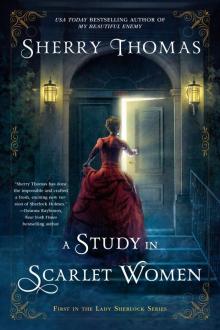 A Study In Scarlet Women
A Study In Scarlet Women The Hollow of Fear
The Hollow of Fear The Magnolia Sword
The Magnolia Sword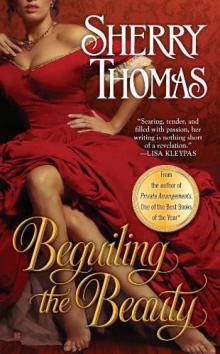 Beguiling the Beauty ft-1
Beguiling the Beauty ft-1 The Heart is a Universe
The Heart is a Universe The Hidden Blade: A Prequel to My Beautiful Enemy (Heart of Blade)
The Hidden Blade: A Prequel to My Beautiful Enemy (Heart of Blade)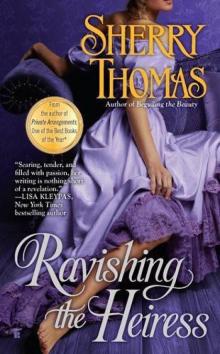 Ravishing the Heiress ft-2
Ravishing the Heiress ft-2 The Immortal Heights
The Immortal Heights The Hidden Blade
The Hidden Blade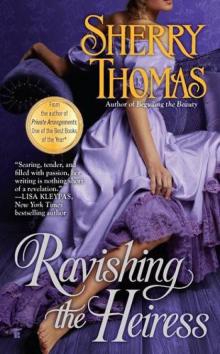 Ravishing the Heiress
Ravishing the Heiress Tempting the Bride
Tempting the Bride The Luckiest Lady in London
The Luckiest Lady in London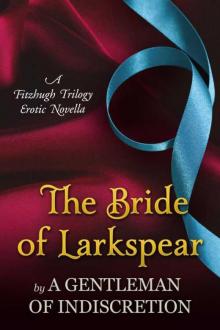 The Bride of Larkspear: A Fitzhugh Trilogy Erotic Novella
The Bride of Larkspear: A Fitzhugh Trilogy Erotic Novella Claiming the Duchess
Claiming the Duchess The One in My Heart
The One in My Heart His At Night
His At Night A Dance in Moonlight
A Dance in Moonlight A Conspiracy in Belgravia
A Conspiracy in Belgravia Not Quite a Husband
Not Quite a Husband